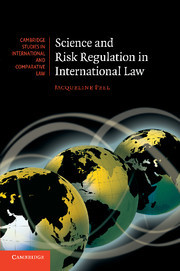Description
Science and Risk Regulation in International Law
Cambridge Studies in International and Comparative Law Series
Author: Peel Jacqueline
Using examples from biosafety to climate change, Jacqueline Peel examines the use and abuse of science in international risk regulation.
Language: English
Subject for Science and Risk Regulation in International Law:
Science and Risk Regulation in International Law
Publication date: 10-2013
Support: Print on demand
Publication date: 10-2013
Support: Print on demand
Science and Risk Regulation in International Law
Publication date: 11-2010
416 p. · 15.9x23.5 cm · Hardback
Publication date: 11-2010
416 p. · 15.9x23.5 cm · Hardback
Description
/li>Contents
/li>Biography
/li>
The regulation of risk is a preoccupation of contemporary global society and an increasingly important part of international law in areas ranging from environmental protection to international trade. This book examines a key aspect of international risk regulation - the way in which science and technical expertise are used in reaching decisions about how to assess and manage global risks. An interdisciplinary analysis is employed to illuminate how science has been used in international legal processes and global institutions such as the World Trade Organization. Case studies of risk regulation in international law are drawn from diverse fields including environmental treaty law, international trade law, food safety regulation and standard-setting, biosafety and chemicals regulation. The book also addresses the important question of the most appropriate balance between science and non-scientific inputs in different areas of international risk regulation.
1. Introduction - science and risk regulation in international law; 2. Global risk governance and its legitimacy; 3. Scientific rationality and risk in international law; 4. Competing risk regulatory paradigms: sound science and the precautionary principle; 5. Science and WTO regulation of SPS risk; 6. Case studies of science and risk regulation in international law; 7. Democratising global risk governance; 8. What role for science in international risk regulation?
Dr Jacqueline Peel is an Associate Professor of Law at the Melbourne Law School, University of Melbourne, Australia. Her research focuses on areas of domestic and international environmental law including climate change, the intersections between law and science, and the precautionary principle.
© 2024 LAVOISIER S.A.S.




